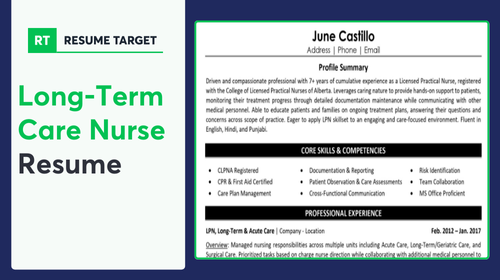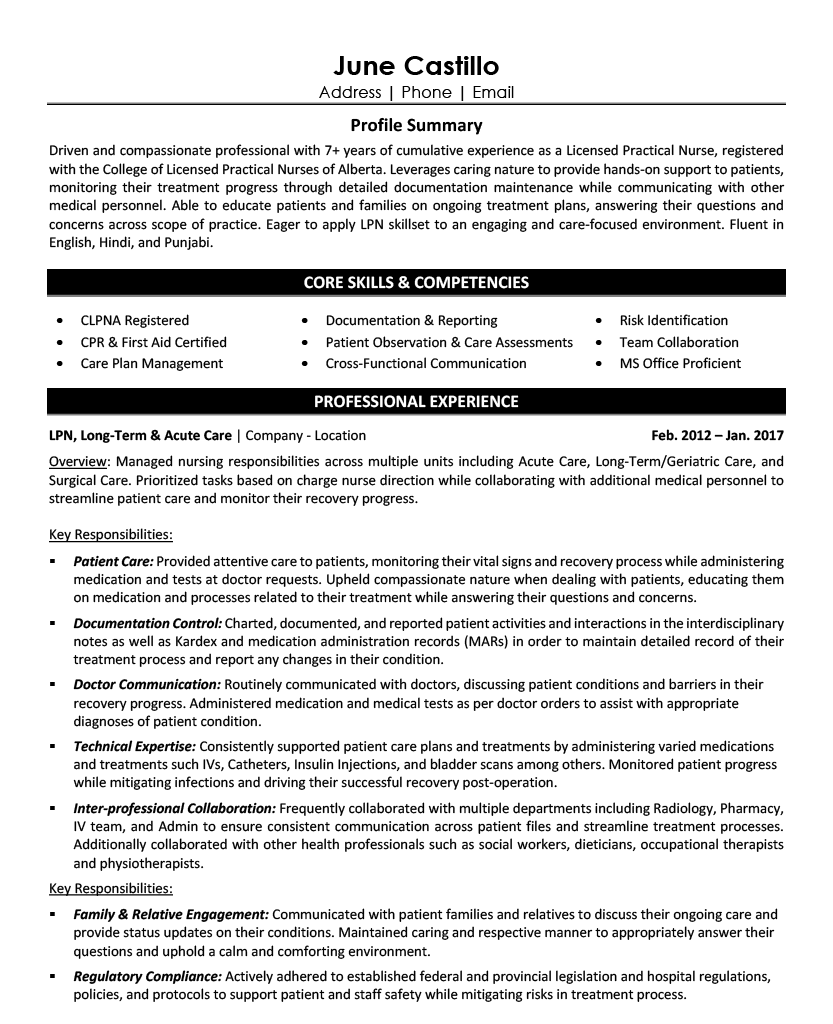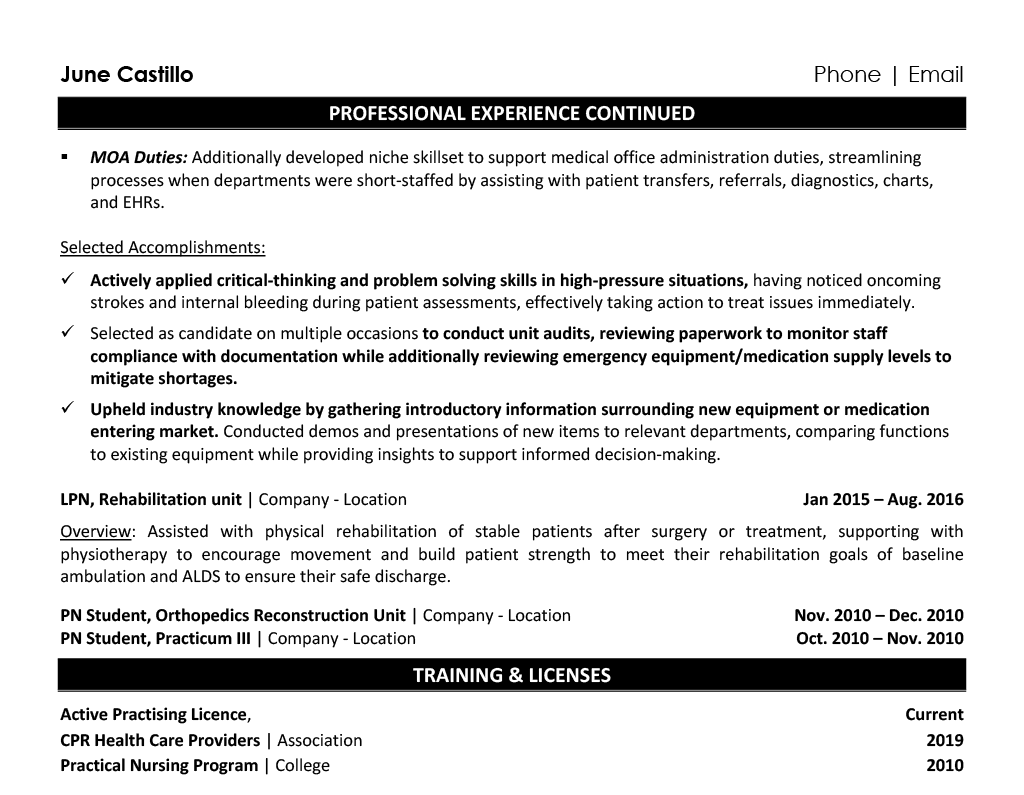

Long-term care nursing demands unique skills that most resumes fail to capture. Many LTC nurses struggle to showcase their specialized expertise in managing chronic conditions and building lasting patient relationships.
Are you finding it challenging to stand out in a crowded healthcare job market? Your resume needs to highlight both your clinical excellence and your ability to provide compassionate, continuous care for elderly and chronically ill patients.
Resume Target specializes in helping long-term care nurses translate their complex responsibilities into powerful career stories. We know how to showcase your specialized skills in geriatric care, wound management, and resident advocacy while emphasizing your role in improving quality of life outcomes.


Unlike traditional hospital nurses who typically see patients for days or weeks, Long-Term Care (LTC) nurses build meaningful relationships with patients who require extended medical support, often forming close bonds through daily interactions while caring for those with chronic illnesses or disabilities.
In this specialized nursing role, you'll wear multiple hats - from medication management and vital sign monitoring to coordinating comprehensive care plans and working alongside physical therapists - all while serving as a crucial bridge between patients, their families, and other healthcare providers.
If you're considering a career in long-term care nursing, you'll find a field that offers both professional growth and emotional rewards, with opportunities to advance into specialized care coordination, facility management, or clinical education roles while making a lasting difference in patients' lives.
Let's talk about the exciting earning potential in Long-Term Care Nursing! Your career path in this rewarding field offers substantial compensation that grows significantly with experience and additional certifications. And guess what? The opportunities for advancement and increased earnings are remarkable, especially as you enhance your expertise and educational credentials.
Figures from: Nursing Education
Starting as an RN in long-term care opens doors to rewarding career growth. With the right certifications and experience in elderly care, you can advance from floor nurse to leadership positions in healthcare facilities.
Beyond basic nursing abilities, advancing in long-term care requires specialized expertise and leadership capabilities that set you apart in geriatric healthcare.
- Advanced wound care management - Geriatric assessment and care planning - Clinical documentation and EHR proficiency - Team leadership and mentoring abilitiesLaunch your Long-Term Care nursing career by earning your RN license through an accredited nursing program, gaining clinical experience, and specializing in geriatric or long-term care settings.
To excel in this rewarding field, you'll need to develop essential skills including critical thinking, creativity, and time management while building your clinical expertise.
Requirements from American Association of Critical-Care Nurses
With nursing homes needing 245,600 workers nationwide, your skills as a Long-Term Care Nurse are in critical demand.
Figures from NCH Statistics
Struggling to capture years of patient care, medical procedures, and relationship building in your long-term care nurse resume? Let's break down exactly how to write each section of your nursing resume to showcase your dedication to resident care and clinical expertise.
As a Long-Term Care Nurse who spends your days focused on patient care and detailed documentation, crafting the perfect resume summary might feel like an overwhelming task.
While you excel at managing complex resident care plans and building meaningful relationships with patients and their families, translating these specialized skills into a compelling summary requires a different approach that helps hiring managers quickly recognize your valuable experience.
How would you characterize your overall approach to providing continuous, compassionate care for elderly or chronically ill patients across your nursing career?
Reason: This helps frame your professional identity and care philosophy, allowing you to showcase your dedication to long-term patient relationships and quality of life improvements. It sets the tone for your entire resume by emphasizing the unique nature of long-term care.
What combination of clinical skills, specialized certifications, and interpersonal abilities best defines your value as a Long-Term Care Nurse?
Reason: This question helps you blend your technical qualifications with the essential soft skills needed in long-term care, creating a well-rounded professional snapshot that resonates with hiring managers.
How have you developed your expertise in managing complex medical conditions while collaborating with interdisciplinary healthcare teams in long-term care settings?
Reason: This prompts you to highlight your ability to handle both the medical complexity of long-term care and the collaborative nature of the role, two critical aspects that employers seek in senior care facilities.
As a Long-Term Care Nurse, your skills section needs to demonstrate both your clinical expertise in managing chronic conditions and your ability to provide compassionate, resident-centered care.
Your resume should showcase advanced medical competencies like wound care and medication management, alongside essential daily skills such as resident assessment, care plan development, and coordination with interdisciplinary healthcare teams.
Showcase your dedication to elder care by organizing your nursing experience into three powerful sections: a concise role overview highlighting your care settings, measurable achievements demonstrating patient outcomes, and core responsibilities that reflect your specialized long-term care expertise.
Many Long-Term Care Nurses struggle to effectively showcase their ongoing patient care successes and quality improvements beyond basic job duties. Transform your nursing impact into compelling achievements by connecting your daily resident care decisions to measurable outcomes in patient satisfaction, safety metrics, and facility performance standards.
The responsibilities section demonstrates how Long-Term Care Nurses provide comprehensive, ongoing care while managing complex patient needs. This section should highlight both clinical expertise and interpersonal skills, showing how your daily work contributes to resident wellness and facility excellence.
Your nursing education and specialized certifications are crucial for demonstrating your expertise in long-term care settings. Start with your highest nursing degree, then highlight your most relevant certifications like your RN license and any geriatric care specializations that show your commitment to elderly patient care.
Now that you've built a strong foundation using Resume Target's comprehensive resume writing guidelines, you're ready to transform your nursing resume from good to exceptional.
While many long-term care nurses focus solely on customizing their cover letters, tailoring your actual resume for each position is crucial in today's competitive healthcare job market.
A customized resume not only helps you bypass automated ATS screenings by incorporating relevant keywords, but it also demonstrates to hiring managers that your specific long-term care experience and skills perfectly align with their facility's needs and patient population.
Ready to stand out from other nursing candidates? Let's turn your resume into a powerful tool that showcases exactly why you're the ideal long-term care nurse for each position you target!
Don't let limited experience hold you back from pursuing your dream career as a Long-Term Care Nurse!
Your nursing education, clinical rotations, and any volunteer or internship experience in healthcare settings can create a compelling story of your readiness to provide compassionate patient care.
Focus on highlighting your nursing degree, relevant certifications, and hands-on clinical experiences to create a standout resume.
For detailed guidance on structuring your healthcare credentials, check out the Student Resume Writing Guide to ensure you're showcasing your potential as a Long-Term Care professional.
Your nursing education and clinical rotations have equipped you with valuable hands-on patient care experience that deserves to be showcased front and center in your resume summary.
Focus on highlighting your specialized training in geriatric care, any relevant certifications, and your genuine passion for providing compassionate long-term care to elderly patients.
"Compassionate and detail-oriented Long-Term Care Nurse with recent BSN degree and 500+ hours of clinical experience specializing in geriatric care and chronic disease management. Demonstrated strong patient assessment skills and expertise in medication administration during clinical rotations at premier long-term care facilities. Proven ability to develop meaningful connections with elderly residents while maintaining accurate medical records and coordinating with healthcare teams. Seeking to leverage clinical training and genuine passion for geriatric care to provide exceptional support for long-term care residents."
Now's your chance to showcase the specialized healthcare education that makes you an exceptional long-term care professional!
Don't just list your nursing degree - highlight relevant clinical rotations, specialized certifications in geriatric care, and impactful projects like developing patient care plans or implementing fall prevention protocols that demonstrate your expertise in long-term care settings.
Long Term Care Nursing CEU Courses cover topics such as restraints and reducing risk for patients, pain management, aspiration, community-acquired pneumonia, and diabetes in the elderly.Relevant Coursework: Restraints and Risk Reduction | Pain Management | Aspiration Prevention | Community-Acquired Pneumonia | Diabetes in the Elderly | Patient Safety Management
Key Projects:
Geriatric Care Protocol Development: Designed and implemented a comprehensive fall prevention program for elderly residents in a simulated long-term care setting, resulting in improved safety protocols and reduced fall risk assessments.
Chronic Disease Management Initiative: Collaborated with an interdisciplinary team to create and execute a diabetes management program for long-term care residents, improving patient outcomes and medication compliance.
Leverage your nursing education, clinical rotations, and healthcare certifications to create a compelling skills section that showcases your ability to provide compassionate, competent care for long-term patients.
As an entry-level Long-Term Care Nurse, your foundation of clinical skills combined with your dedication to resident care positions you well for a rewarding career in geriatric healthcare, where the demand for skilled nursing professionals continues to grow.
Let's face it - capturing years of compassionate patient care, complex medical procedures, and those countless moments of making a real difference in residents' lives isn't easy to fit onto two pages of resume space.
At Resume Target, we understand the unique challenges long-term care nurses face in the healthcare industry, and we've helped hundreds of LTC professionals showcase their specialized skills, from wound care expertise to resident advocacy achievements.
Our healthcare resume specialists have transformed countless nursing resumes into powerful career tools that highlight both clinical excellence and emotional intelligence.
With healthcare facilities actively seeking experienced LTC nurses right now, don't let an outdated resume hold you back from your next career move - connect with our team today to craft a resume that truly reflects your dedication and expertise.
Impress any hiring manager with our Nurse resume writing service. We work with all career levels and types of Nurse professionals.
Learn More → Nurse Resume Writing Services